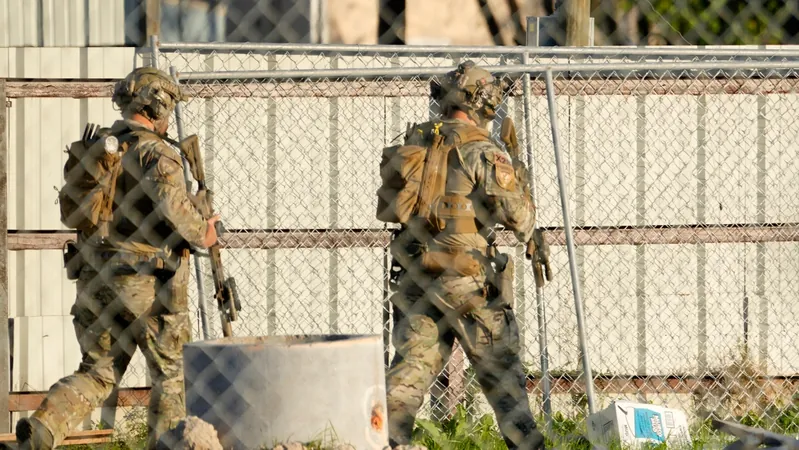
Alarming New Orleans Attack Raises Red Flags Over Domestic Terrorism Connected to Global Extremism
2025-01-04
Author: Jacob
In a chilling turn of events that has sent shockwaves across the nation, FBI Director Christopher Wray recently highlighted the rising risks of homegrown terrorism following violent incidents across the globe.
The backdrop of international chaos, notably after Hamas's deadly assault on Israel, has intensified fears that such global conflicts might incite individuals to commit acts of terror on American soil.
A Tragic Incident in New Orleans
In an unsettling incident in New Orleans, an Army veteran inspired by the ideologies of the Islamic State perpetrated a brutal attack, driving a pickup truck into crowds celebrating New Year’s Eve.
Tragically, this assault resulted in the loss of 14 lives. Significantly, the perpetrator acted alone, showcasing the persistent threat posed by radicalized individuals who often operate independently, fueled by a blend of personal grievances and extremist beliefs.
Expert Insights on Domestic Terrorism
Christopher Costa, an ex-intelligence officer, remarked on the troubling trend that has developed since the horrific events of September 11.
The case of 42-year-old Shamsud-Din Jabbar reflects a disturbing pattern, having grappled with multiple divorces and financial woes that culminated in his violent outburst.
This incident serves as a stark reminder that today's terrorists often do not require direct affiliations or support from organized groups to strike fear into communities.
The Complex Motivations Behind Terrorism
Wray's insights into the current terrorism landscape reveal a complex web of motivations.
The recent turmoil in the Middle East, including the aftermath of Hamas attacks and uprisings in Syria, seems to have provided a fertile ground for radical ideology to flourish.
Jabbar's actions appeared to resonate with broader narratives propagated by terror groups, particularly in light of an alarming trend towards individualistic, uncoordinated terrorism which closely resembles the previous attacks, such as the devastating 2016 Orlando nightclub shooting.
The Threat of Isolated Actors
The threat posed by isolated actors like Jabbar has been aggravated by heightened international instability and vehicle-ramming tactics, reminiscent of popular methods encouraged by terror organizations.
Reports indicate that just days before the New Orleans incident, pro-ISIS media outlets had, in fact, urged sympathizers to target New Year’s events, unknowingly laying bare the susceptibility of followers to these calls for violence.
National Response and Counter-Terrorism
As attention shifts to the national response, the New Orleans tragedy underscores not only the complexities of monitoring potential threats but also the need for robust counter-terrorism measures.
Law enforcement and intelligence agencies face an uphill battle when confronting lone wolves who lack previous police records but harbor dangerous motives.
Leadership Changes and Their Implications
Amidst this escalating threat landscape, the upcoming leadership changes within the FBI could reshape the nation’s approach to combating terrorism.
The anticipated nomination of Kash Patel, a controversial figure skeptical of the FBI's current national security strategies, adds an intriguing layer to the unfolding scenario—drawing focus to the critical question of how best to balance security and civil liberties during such precarious times.
The Fallout from International Conflicts
To further complicate matters, the fallout from conflict in Syria adds another significant variable.
The uncertain future following the ouster of President Bashar Assad highlights fears of potential power vacuums and a resurgence of IS, intensifying concerns among both U.S. and European officials regarding the destabilization effects that could spill over into domestic security threats.
Conclusion: The Need for Vigilance
While the New Orleans attack might seem isolated, experts stress that even a single incident could serve as a catalyst for broader repercussions.
The stark reality remains that anyone with intent, access to resources, and an allegiance to extremist ideologies can exploit simplistic methods to inflict harm, leading to increased vigilance in the coming weeks and beyond.
As communities grapple with the lessons learned from this tragedy, it is critical for citizens to remain aware of their surroundings, report suspicious activities, and foster dialogue around these pressing issues.
The question now remains: what can be done to safeguard against the unpredictable nature of terrorism as it evolves in an increasingly interconnected world?



 Brasil (PT)
Brasil (PT)
 Canada (EN)
Canada (EN)
 Chile (ES)
Chile (ES)
 Česko (CS)
Česko (CS)
 대한민국 (KO)
대한민국 (KO)
 España (ES)
España (ES)
 France (FR)
France (FR)
 Hong Kong (EN)
Hong Kong (EN)
 Italia (IT)
Italia (IT)
 日本 (JA)
日本 (JA)
 Magyarország (HU)
Magyarország (HU)
 Norge (NO)
Norge (NO)
 Polska (PL)
Polska (PL)
 Schweiz (DE)
Schweiz (DE)
 Singapore (EN)
Singapore (EN)
 Sverige (SV)
Sverige (SV)
 Suomi (FI)
Suomi (FI)
 Türkiye (TR)
Türkiye (TR)
 الإمارات العربية المتحدة (AR)
الإمارات العربية المتحدة (AR)